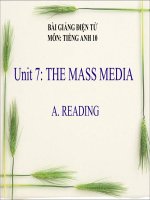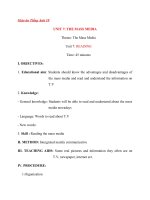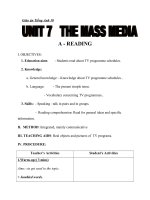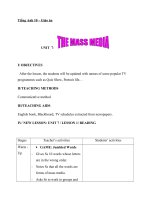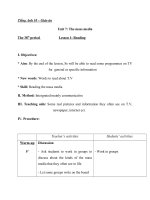Giáo án Tiếng Anh 10 Unit 7: The mass media
Bạn đang xem bản rút gọn của tài liệu. Xem và tải ngay bản đầy đủ của tài liệu tại đây (159.09 KB, 28 trang )
Giáo án Tiếng Anh 10
Unit Seven : THE MASS MEDIA
A : Reading
Time: 45 minutes
I. Objectives
1. Educational aim: Ss should appreciate the important role of the mass
media from which
they can get necessary information to enrich their
knowledge.
2. Knowledge:
- General Knowledge: Ss learn some popular TV programmers on VTV
channel.
- Language: Words or phrases related to TV programmers.
3. Skills: Reading for gist and for specific information; matching; answering
questions
II. Teaching methods: integrate, mainly communicative approach
III. Teaching aids: Posters; pictures
IV. Procedures:
Teacher’s activities
Students’ activities
Warm - up : (3mn)
- Stick the pictures of the scenes of some
TVprogrammes on the board.
- Ask Ss to write the name of the programme
- Look at the pictures and listen to
teacher's instruction.
- Take turns to do the task.
for each picture.
- Put the class into four groups.
- Have members of each group write the
results on the board.
- Check the results, and then state the winner.
- Introduce new lesson: TV is a typical type of
the mass media. Today we're learning some
TV
programmers on VTV channel.
Before - reading (7mn)
-
Make questions
+Do you often watch TV?
+ When do you often watch it?
+ How many hours per week do you watch?
+ Which programmers do you often watch?
+ Which channel do you like best?
- Listen and answer teacher's questions.
- List some new words / phrases and give the
Vietnamese meanings.
• Sport Comment
- Repeat after T
• Folk Song
- Copy down new words.
• News Headlines
• Weather Forecast
• Drama
• Portrait of Life
- Ask Ss to read these words
- Listen
- Ask Ss to copy these words
- Work in pairs, matching each word
While - reading (23mn)
Task 1
- Explain the instruction
- Go through new words
- Let students do the task in pairs.
- Go round to give help.
- Ask them to compare the results with other
pairs'.
- Have students tell and write the results on the
in A with its definition in B.
- After finishing the task, compare the
results.
- Tell teacher the results and write them
on the board.
- Give comment and copy down
correct answers.
Suggested answers
1.c
2.a
3.d
4.b
board.
- Ask for Ss’ comment and then correct the
errors.
- Read the statements, and then look
back at the TV programmers.
- Decide true / false statements.
- Compare the results with their partners'
- Give feedback
- Take turns to tell the results.
Task 2
- Copy down correct answers.
- Make sure students understand the
Suggested answers
instruction.
1.T
- Have Ss do the task in individual, and then
2.T
discuss with a partner.
- Go round to give help.
- Ask students to tell and write the results on
the board.
3. F The Nature of Language is the
documentary prgrammes at 15:15 on
VTV3.
4. T
5.F The last programme starts at 23:
30.
- Read all the questions.
- Correct the errors.
- Give feedback
Task 3
- Make sure Ss understand the questions.
- Answer the questions individually.
- In pairs, discuss the answers
- Write the answers on board
- Guide them how to do the task.
Suggested answers:
- Ask Ss to work individually
- Ask Ss to compare the answers with their
partners
1. Five films are on.
2. At 9:00 a.m., 12:00, 7:00p.m.,
11:00p.m. on VTV1 and 7:00 p.m. on
- Have Ss write the answers on the board.
VTV3.
3. VTV2
4. The Quiz Show
5. I should watch VTV1.
6. Football.
- Discuss with partners on a TV
programme you like best and tell the
- Check the answers and correct the errors.
- Give feedback
After - reading (10mn)
reasons why.
- Present in front of class
- Put students into groups
- Go round to control and give help.
- Call some Ss to present in front of the class.
Homework
- Learn by heart all the new words
- Have preparation for the next period.
Comment :(2mn)
- Do what T asks
Unit Seven : THE MASS MEDIA
B : Speaking
Time: 45 minutes
I- Objectives
1. Educational aim: Ss should know many types of mass media and their
features as well.
2. Knowledge :
- General knowledge: Ss learn to talk about the features of some
types of mass media.
- Language: Sentences for talking about the features of some types
of mass media.
3. Skills: Asking and answering about the uses of media; talking about
different types of media
II. Teaching methods:
Integrate, mainly communicative
III. Teaching aids: Real objects such as books, magazines, newspapers …Pictures
of a TV, a radio, computer …
IV. Procedures:
Teacher’s activities
Students’ activities
Warm - up (3mn)
- Ask Ss some questions:
- Answer teacher's questions
+ Could you tell me some types of media?
+ Which type do you often use?
Task 1 (10’)
- Let students work in pairs.
- Work in pairs, putting a tick next to
- Go round to give help.
the words that are types of media.
- Call some Ss to tell and write the answers on
the board.
- Take turns to tell the results to
teacher.
Suggested answers:
- Check for errors and correct them.
Task 2 : (15mn)
internet
- Help student understand some words by
guessing:
Orally. Adv/
TV, books, magazines, newspapers,
/: Spoken by mouth.
Aurally . adv /
/: heard by ears
Visually. Adv /
/: sen by eyes.
through eyes / mouth
- Ask students read the cues; make sure they
can master all of them.
- Explain the example and get sts to work in
pairs
- After sts finish, ask some to present their
discussion.
- Give feedback
Task 3 : (15mn)
- Put students in groups
- Try to understand the cues.
- In pairs, practise talking about the
features of mass media.
- Present in front of the class as
suggested
- Work in groups, talking about
- Go round to give help.
different types of media.
- Have Ss write the answers on the board.
- Answer the questions.
- Write the answers on the board.
Suggested answers
1. The mass media includes TV, radio,
newspapers, and internet.
2. The features they have in common
are that they provide information and
entertainment to people.
3. TV present information and
entertainment visually and we receive
them through our eyes. Radio provides
information and entertainment orally
and we receive them aurally.
4- Newspapers present information and
entertainment visually and we receive
them through our eyes.
5- Internet provides information and
entertainment visually and orally and
we receive them through our eyes and
our ears.
- Take notes
- Ask for comments and correct errors
- Do what T asks
- Give feedback
Homework:
- Write a paragraph about the features of media
based on the questions in task 3
- Prepare part C. Listening
Comment : (2mn)
Unit Seven : THE MASS MEDIA
C : Listening
Time: 45 minutes
I. Objectives:
1. Aim: Ss should appreciate how important and convenient the mass media
are to our lives.
2. Knowledge :
General knowledge: Ss learn how the news be broadcasted on the radio.
Language: New words/ phrases related to floods and mountain climbing.
3. Skills: Listening for gist and for specific information.
II. Teaching method: Integrated, mainly communicative
III. Teaching aids: handouts, cassette tape
IV. Procedures:
Teacher’s activities
Students’ activities
Warm – up : (4 mn)
- Show a picture of a radio and ask Ss some
- Answers the questions
questions:
1. What’s it?
2. How often do you listen to the radio?
1- It is a radio.
2- We / I listen to the radio every
day
3. What topics do you like listening to? why?
3- Music. Because it is interesting
Pre – listening : (8 mn)
- Teach new words in the table:
- Guess new words
• heavy rain (n) : mưa lớn
- Read the new words
• to cause : gây ra
- Copy down
• strong (adj) : mạnh
• healthy (adj) :khỏe mạnh
• cloudy (adj) :có mây
• top (n) : đỉnh (núi)
While – listening : (23mn)
Task 1
- Explain the instruction
- Play the recording the first time.
- Listen T’s explanation
- Play the tape again and ask Ss to do the task
- Listen to the tape
- Play the recording the third time for students to
check the answers.
- Work individually first, then
compare the answers in pairs :
Suggested answer:
News
News
story 1
story 2
healthy
strong
√
√
young
cloudy
√
√
highest
√
wonderful
√
- Read through the news stories
Task 2
- Ask Ss to listen to the radio news stories again and
fill in the missing words
- Tell Ss to discuss the answers in pairs
- Call some Ss to read the answers and correct the
mistakes
before filling in the blanks.
- Pair-work
- Give the answers and copy down
the correct ones.
Suggested answer
News story 1
1. has cause
floods
2. have left
their homes
3. have risen
New story 2
1. twenty-third
2. 4,418
3. California
4. wonderful
4. two meters
5. has stopped
5. young and
healthy
6. cloudy
7. strong wind
- Give feedback
Task 3
- Explain the requirement of the task to Ss
- Let Ss listen
- Listen and answer the questions
- Listen to the tape
- Discuss the answers in pairs
- Give the answers
Suggested answer
- Discuss the answers in pairs
- Call some Ss to give their answers
1. Heavy rain has caused floods all
over the country during the night.
2. Because rivers have risen.
3. The old lady has climbed Mount
Whitney twenty-three times.
4. Because it has kept her young and
healthy
- Take notes
- Give feedback
- Work in groups
- Present in frontf the class
Post – listening : (8mn)
- Has Ss sit in groups, choose one of the news
stories and tell one another about it.
- Calls 2 representatives of 2 groups to retell the
stories in front of the class.
- Give feedback
Homework
-Write a short paragraph summarizing one of the
two news stories.
- Prepare new lesson: Writing
Comment : (2mn)
Unit Seven : THE MASS MEDIA
D : Writing
Time: 45 minutes
I. Objectives:
1. Aim: By the end of the lesson, Ss should make use of the advantages of the
mass media and
minimize the disadvantages.
2. Knowledge :
General knowledge: Ss learn about the advantages and disadvantages of the
mass
media.
Language: words / phrases / structures related to Mass media
3. Skills: writing about advantages and disadvantages of one of the mass
media.
II. Teaching method: Integrate, mainly communicative
III. Teaching aids: pictures of radio, television, and computer
IV. Procedures:
Teacher’s activities
Warm – up : (4mn)
Students’ activities
- Show a few pictures of television, radio,
newspaper and computer then asks questions
- Answers the questions
Sts’answers may vary
:
1. What are they called?
2. Do you have them in your house?
3. What are the advantages and disadvantages
of TV?
Pre-writing : (10mn)
Task 1
- Have Ss read through the advantages and
disadvantages of TV in task 1, then
encourage
them to find out the new words / phrases /
structures
- Pre-teach vocabulary
- Read task 1, underline the new
words / phrases / structures
• memorable (adj) : dễ nhớ
Guess new words
• to entertain : giải trí
- Repeat after T
• popularity (n) : sự phổ biến
- Copy down
• violent (adj) : bạo lực
• to interfere : can thiệp, xen vào
• help / encourage someone to do s.th :
giúp, khuyến khích ai làm gì
• make someone / something + adj :
làm / khiến ai …
While-writing :(17mn)
Task 2
- Ask Ss to work in groups to discuss the
advantages and disadvantages of the mass
media.
Advantages
Disadvantage
s
-
Radio
Group 1
Group 2
Newspaper
Group 3
Group 4
The internet
Group 5
Group 6
- Work in groups to do the task.
Walk around the class to help students
when they need help
-
Call six representatives of six groups to
write down their answers on the board.
Suggested answer
Group 1: - Make people happy/life
easier
- Relax
- Get/enlarge/broaden knowledge,
understanding
- Share opinions/experiences
Group 2:
- Waste time
- Make people passive
Group 3:
- Make people happy/life easier.
- Get information on many fields :
culture, art …
- Relax and entertain
Group 4:
- Harm people’s eyes: be shortsighted
- Cost time and money
- Make people passive
Group 5:
- Make people happy/life easier.
- Provide quick and daily access to
information and entertainment.
- Get information on many fields.
- Relax and entertain
Group 6:
- Harm people’s eyes: be shortsighted
- Cost time and money
- Make people passive
- Take time away from activities
such as sports …
- Conduct the correction
- Ask the whole class to give their opinion
- Take notes
about the answers of each group
- Give feedback
Post-writing : (10mn)
Task 3
- Ask Ss to work in groups to write a short
paragraph about the advantages and
disadvantages of one of these topics:
+ Listening to music.
- Work in groups
+ Reading newspaper.
+ Using the Internet.
+ Watching TV.
- Corrects one piece of writing for st to selfcorrect.
Homework
- Write the advantages and disadvantages of
using computers.
- Prepare Language Focus
Comment : (2mn)
- Do what T asks at home
Unit Seven : THE MASS MEDIA
E : Language Focus
Time: 45 minutes
I. Objectives
1. Aim: By the end of the lesson, Ss will be able to know more about different
types of the mass
media.
2. Knowledge : - Pronunciation :/eI/, /aI/, /OI /
- Grammar: -The present perfect
-Because of and In spite of
3. Skills: Applying and doing exercises
II. Teaching method: Integrate, mainly communicative
III. Teaching aids: Pictures showing some of media, e.g., a newspaper, a radio,
etc.
IV. Procedures:
Teacher’s Activities
Students’ Activities
Warm-up : (3mn)
- Put a picture showing a radio, a
newspaper, a toy on the board and ask
- Answers the questions
questions
- Sts’answers may vary
1. What can you see in this picture?
2. How do you think these words are
pronounced?
A. Pronunciation (15mn)
- Guide students how to pronounce the
sounds :/ eI /, / aI /, / OI /
- Listen and repeat.
- Read the words that contain these sounds.
/eI/
/aI/
/OI /
play
time
voice
today
wildlife
noise
radio
height
toy
newspaper
buy
enjoy
they
type
destroy
- Listen and repeat:
- Call some Ss to read
- Correct students’ pronunciation.
- Read the sentences that contain these
sounds.
1. I’m afraid you’ve made a mistake.
- Listen and repeat.
- Practise the sentences:
2. They changed the timetable at the end
of April.
3. I have ninety-nine pages to type by
Friday.
4. Would you like to go for a ride with me
on Friday?
5. This is the noisiest Rolls Royce I’ve
ever heard.
6. While you’re changing the oil, I’ll go
and visit my boy.
- Ask Ss to practice in pairs
- Call some pairs speak in front of class
- Practice in pairs
- Speak in front of class
B. Grammar and vocabulary (23mn)
1.The present perfect
- Answer the questions
- Give the situations and ask Ss to tell the
form and uses of the present perfect
Ex : I lived here from 2000.
I’ve lived here since 2000.
I’ve been here for 7 years.
Form:
Have/ Has + past participle
Exercise 1: Complete the letter, using the
present perfect of the verbs in the box.
- Ask Ss to work in pairs/ groups
- Call some Ss to read the answers
- Work in pairs/ groups
- Give the answers
Suggested answers
- Give feedback
1. have been
5. have had
2. has lived
6. have taken
3. have met
7. have watched
4. have done
Exercise 2: Complete the sentences using
for, since or ago
- Make clear the use of for, since and ago
•
For: used in Present perfect,
denoting a period of time
•
Since: used in Present perfect,
denoting a point of time
•
Ago : used in Past simple
- Learn how to use for, since and
ago
